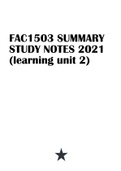Summary
FAC1503 Financial Accounting Principles For Law Practitioners SUMMARY STUDY NOTES 2021 (learning unit 2).
- Module
- Institution
FAC1503 Financial Accounting Principles For Law Practitioners SUMMARY STUDY NOTES 2021 (learning unit 2). Contents Learning outcomes ................................................................................................................... 2 Key concepts ....................................
[Show more]



